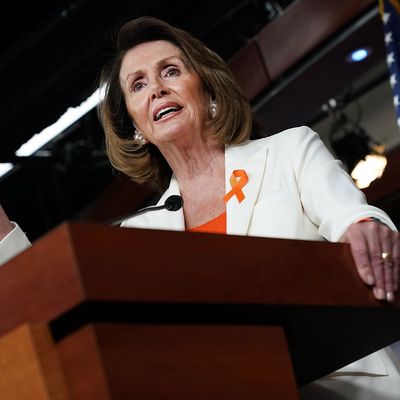
It was probably inevitable: After years of acting as the “adults in the room” by supporting “responsible” Republicans seeking to fight back conservative efforts to use the threat of a debt default to extract policy concessions from a Democratic president, congressional Democrats are now thinking about playing some games themselves. House Democratic Leader Nancy Pelosi served notice late last week that her caucus might modify its past support for a “clean” debt-limit increase and instead issue some demands of their own, such as a public commitment from the Trump administration and their congressional allies that they will not follow up a debt-limit increase with a budget-busting top-end tax cut.
“I don’t have any intention of lifting the debt ceiling to enable the Republicans to give another tax break to wealthy in this country,” Pelosi said. “When we say a clean debt limit, we mean not one that enables the Republicans to have a giant tax cut for the rich. That’s not why we’re lifting the debt limit.”
More specifically, the talk in Democratic circles — in the Senate as well as the House — is to hold Republicans to earlier pledges of deficit-neutrality in whatever they decide to do on the tax front. That would have the practical effect of significantly scaling back the GOP’s original plans for massive corporate and individual tax cuts, since Republicans are hopelessly divided on the kind of revenue-raisers that would be necessary to “pay” for them. And more generally, it would deter the administration and the congressional GOP leadership from even considering concessions to House Freedom Caucus types who have eternally demanded deep spending cuts and/or big conservative policy “riders” as the minimum price for a debt-limit increase. Without monolithic Democratic support, a debt-limit increase is not likely to survive such demands in the House.
The opportunity for a little Democratic hostage-taking on the debt limit is a product of the GOP’s messed-up 2017 congressional schedule. Originally, Congress was supposed to be done with the Obamacare repeal-and-replace legislation by now, and well into the tax-cut phase of its agenda, with a debt-limit increase not considered necessary until early fall. But now the Trump administration is publicly admitting that it won’t have its own tax-cut proposal written until after Congress’s long August recess, even as Treasury secretary Steven Mnuchin and budget director Mick* Mulvaney jointly signal that Congress needs to extend the debt limit before that recess. The linkage between the two issues is now all but unavoidable, particularly as the White House continues to make it clear that it won’t let its alleged concern about budget deficits get in the way of a tax cut.
No one knows at this point how far congressional Democrats will carry the threat to make support for a debt-limit increase contingent on GOP resistance to both deep spending cuts and non-revenue-neutral tax cuts. But for the moment, it probably feels liberating to have something to say on the debt-limit issue other than: “Of course we will do the right thing.”
This post has been updated with the correct spelling of Mick Mulvaney’s first name.






























